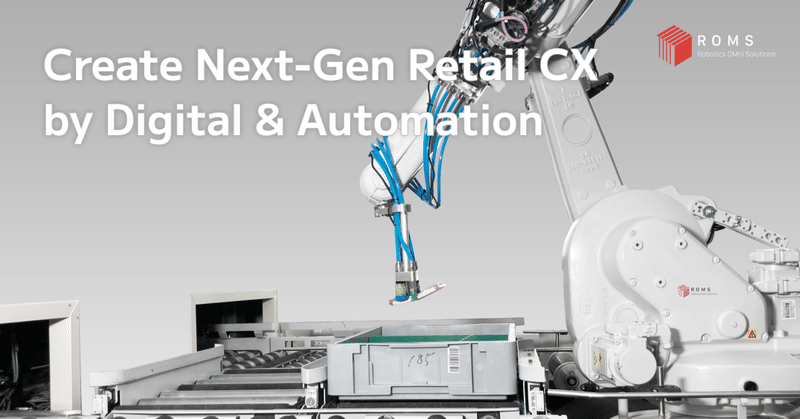
[Raised JPY 1.2 billion] ROMS CEO and Investors Discussion of Industry Transformation Challenged by Deep Tech x Retail
We are pleased to announce that ROMS has secured a total of JPY 1.2 billion in capital investments.
The three key figures behind this round – ROMS CEO Yosuke Maeno, Akira Kurabayashi from DNX Ventures, and Yuki Hayashi of UTEC who both participated in the previous round, sat down to talk about how they met, the story behind this series, and ROMS’ future challenges and expectations.
Profile
Yosuke Maeno

ROMS CEO
CEO, ROMS, Inc.
Yosuke started his career at a major Japanese trading company, gaining experience in M&A, venture capital, and new business development both in Japan and overseas, as well as serving a robotics startup on a secondment assignment. In 2018 he joined a major apparel company, responsible for promoting digital integration of brick-and-mortar stores and e-commerce and developing partnerships with overseas tech companies. He co-founded ROMS as Representative Director in 2019.
Akira Kurabayashi

Managing Partner and Head of Japan, DNX Ventures
Managing Partner and Head of Japan, DNX Ventures
Akira was an investor at Fujitsu Limited and Mitsui & Co., working with Japanese and US startups and supporting their business development initiatives. After obtaining his MBA, he served at Globespan Capital and Salesforce Ventures as the Japan Representative. In March 2015, he joined DNX Ventures, an early-stage VC for B-to-B startups in Japan and the US. He was named Managing Partner and Head of Japan since 2020. Doshisha University PhD, Wharton MBA.
Yuki Hayashi

Principal & Data Scientist, UTEC
Principal & Data Scientist, UTEC
Yuki started working as an engineer at an ad-tech startup when he was an undergraduate student of The University of Tokyo Faculty of Engineering (Department of Mechano-Informatics). He joined UTEC after completing his studies at the Graduate School of Engineering, The University of Tokyo (Technology Management for Innovation). Yuki’s current portfolio comprises of 12 companies in Japan and the UK, serving as an independent director for 5 firms and an auditor for another. Principal from 2022. Chartered Financial Analyst.
Introduction – The Founding of ROMS and the Journey So Far
ROMS is a startup providing automation solutions, founded in June 2019 by The University of Tokyo Edge Capital Partners Co., Ltd. (“UTEC”), Yosuke, and two Polish co-founders.
The ROMS story begins when two Polish engineers, who had been wondering how to monetize the automated warehouse and robotics technology that they had developed, met UTEC Partner Tetsuya Yamamoto (“Ted”, currently Co-representative and General Partner of Waseda University Ventures, Inc.) who subsequently introduced them to his former colleague Yosuke. UTEC joined the project as a Series A investor, and the company was officially launched with this capital. It was initially based in two locations – Tokyo (headquarters and target market) and Poland (R&D).
The original idea was to adapt the technology to convenience stores, where the sustainability of the 24/7 business model and the difficulty of franchise succession planning were hot topics. ROMS envisioned a Robotics Convenience Store (RCS) that would robotically pick and bag any variety of products ordered by customers, and opened “MOPU” as a PoC store in Azumabashi Tokyo in October 2020 (currently closed).
Following a number of requests from directors of retail companies to use the system for 24-hour order fulfillment (picking and packaging orders) in online supermarkets, ROMS expanded its business horizontally to include the Nano-Fulfillment Center (NFC).
Most recently, ROMS announced the first close of a JPY 1.2 billion deal with DNX Ventures as the lead investor. It has also, in partnership with KDDI, implemented an RCS as a small-scale automated fulfillment center in the au Minutes Store Shibuya as part of a quick commerce initiative.
How DNX and UTEC met ROMS
“ROMS is an important part of my career as a venture capitalist” – Yuki
ROMS is an important part of my career as a venture capitalist. Ted, who was Partner at UTEC at the time, included me in the project right before I joined the firm.
The first time I met Yosuke was at a dinner in March 2019. The Polish co-founders of ROMS were in Tokyo and we were going to introduce them to Yosuke that night.
I had heard that Yosuke had been super-fast tracked for management in the Japanese trading company, that many expected he would become one of the top leaders of the firm. So I was impressed that someone would throw away such a promising future to start his own company. That night over dinner, Yosuke hit it off immediately with the Polish co-founders, and the following week he was already flying to London to meet them. My first impression was that this is a very dynamic project, where everything moves forward at lightning speed.
My field of study in university was quite close to robotics. As such, I was aware that there were many startups in this field, but my concern was that not many of them seemed to offer industry-specific solutions. I thought ROMS was exciting because it seemed willing to take on that challenge.
“The most interesting deal that I had ever come across” – Akira
I was also introduced to ROMS by Ted. I remember I made Ted furious at the meeting because I remarked on the spot that it was the most interesting deal he had ever brought me. Yosuke seemed a bit suspicious of me at first, but he opened up as we got chatting. He also found it hilarious that Ted was so outraged.
When it came to considering the investment, I liked ROMS because the pain points they were trying to address were clear. I was aware of these issues in the retail sector because I had read an article about mom-and-pop franchisees struggling to manage their convenience stores.
Another reason I was interested in ROMS is that it diversified our portfolio. The DNX Japan portfolio is mostly comprised of SaaS companies, but our US office invests in subscription-based hardware solution companies like ICEYE and Diligent Robotics, and I was quite keen to explore something similar for Japan.
How ROMS secured the JPY 1.2 billion investment
“We rebuilt the engineering team and learnt many lessons from our PoC” – Yosuke
To be honest, we went through so much since the founding of the company, and it has not been easy. For instance when the pandemic stalled us, we severed ties with the Polish team and rebuilt our engineering team here in Japan.
On the plus side, by opening a PoC store we were able to figure out our line of attack. The next thing we need is cash, the fuel to feed our engine. This is why we approached our investors.
If we were to rely on our retailer clients to provide us with this much money, we would be waiting for a very, very long time. With the 1.2 billion yen we have raised, I want to take the team as far as possible, as high as possible.
It really means a lot to us that we managed to raise capital at this point in time. Cash completely changes the dynamics of what we can do. Without cash, we will be restricted to the bare minimum; it also limits the solutions we can propose to our clients. With cash we can consider all sorts of options, be it trials or subscription-based models.
“The deciding factors were the team and the successful acquisition of a client” – Akira
DNX is an early-stage VC, so we place a lot of value on the team. In Japan, it is very difficult to oust the management team like they do in the US, so investing means we bet on the existing management team and do our best to support them.
I have followed ROMS on their journey from Series A to B, and I have always been comfortable with the team. The market is also exciting, and presents a worthwhile challenge.
For us at DNX though, this was the first deal of a new fund, and furthermore, ROMS is not a pure SaaS which is DNX’s main area of expertise. To get the necessary approvals internally, I wanted to see some traction. Something to prove the PMF, to show that they are solving real problems for real customers.
In this sense, signing on the initial target clients gave us the level of comfort that we needed.
“We decided to invest because of the management team and market traction” – Yuki
For us at UTEC, the deciding factors were also the team and market traction.
The previous round took place when ROMS was splitting off the Polish division, making Yosuke a one-man management team. Now we have Abe-san as Executive Director of Strategy & Partnership and Waki-san as Chief of Staff in the President Office. Having a proper management team in place made a big difference to us.
I also feel that the market momentum for NFC is building.
Akira: Yes, we also felt that identifying NFC as the way forward was a big milestone. Running an actual store like a robotic convenience store involves complicated B-to-C elements like merchandising and interfaces, but an NFC is B-to-B, meaning the business model is much simpler. When ROMS honed in on NFC, it narrowed down what needs to be done, and we felt things click into place.
The Challenges of Transforming the Retail Sector with Hardware Solutions
“I believe our solutions should be Operation-led” – Yosuke
The retail sector is exciting because you are a lot more likely to be able to talk to the executives. In other B-to-B markets, unless it is an SMB, getting a meeting with senior executives like CEOs or board members is definitely not as easy.
I think retail, especially supermarkets, is a very dynamic market because CEOs and board members often come out to bat, and when they like what they hear, things can move very quickly.
The difficulty however, is that although the headquarters are aware of the bigger problems, at operations level the number one priority is to hit daily, weekly, monthly targets, and their initial reaction is “sorry, but we don’t have time for this.” There is a big gap between the company leadership and what happens on the ground.
But for our business, we ultimately need to work with the operations staff. This is a given, and so we need to dig deep to identify a realistic workable solution and the best way to deploy it.
This is another reason why at ROMS, we want to be operations-led, not product-led. Most retailers have relatively established operations, and trying to force our own product ideas onto it will not work. Instead, we need to look at the existing operations, and think about how ROMS can aid innovation by injecting our insights. If innovation can change the scene, what would such a product look like? The key is to find a way in through the operations. I am not interested in pursuing a product-led approach.
Investors’ Analysis of ROMS’ Strengths and Future Expectations
“Experiment with different sales approaches that would work with the long sales cycle” – Akira
I had counted on there being market demand, but the sales cycle took longer than I expected. If all future deals take this long it would be tough, but I think once the first penguin jumps, others will scramble to follow.
Now we need to look at pricing, as well as balancing the price with pricing models, which is an area where DNX can certainly contribute.
I don’t think ROMS should try to be too global, because making a breakthrough in the Japanese retail sector would be a good differentiator. I would like to see ROMS experiment with different sales approaches with the cash procured in this round.
“The full stack should help address ‘burning needs’” – Yuki
I actually expected the sales cycle to take a while. It tends to be that way in deep tech, which is our main investment target.
Because the sales cycle is so long and difficult, there aren’t many start-ups who are willing to take up the challenge. On the other hand, there is a burning need in the market.
To avail of this opportunity, you need a good team and good technology. From a technology point of view, I have watched ROMS move steadily forward between series A-1 to B by shifting everything inhouse and developing technology components to provide solutions to retailers.
ROMS’ strengths right now are its inhouse full-stack capabilities and its customer-oriented culture. It used to rely on a third-party picking system, but ROMS switched to inhouse to develop retail-specific picking technology that could cater to customer needs. This kind of thinking – to take on a new development project for the sake of adding value to customers – is often difficult in the hardware startup world. For example, if you already have existing research, you tend to base everything on that and try to see what you can do with it, not the other way round.
ROMS is not part of a research project or a university but a gang of talented individuals, and I think this is another of its strengths.
I also think that a full-stack gives you the ability to serve customers facing different challenges. Retailers regularly scrutinize every penny to finetune their operations, meaning each retailer has unique goals and priorities, and it’s a big plus to be able to offer modules that can be implemented on an as-needed basis.
The next thing I expect from ROMS for the business side is to ensure the first client, the honorable first penguin, is thoroughly satisfied.
Akira: I agree. It also needs to validate the economic value of the live system. Many American ventures succeed on their second, if not their third stores, so demonstrating the ROI of the actual machines is important.
As for the team, it needs to be innovative. Most retailers diligently improve their operations by the penny, so any proposal would need to be more than “just another improvement”.
I see this innovation coming from diversity – be it backgrounds, gender, age etc. I would like to see a diverse team at ROMS.
The Uniqueness of the ROMS Team
“Transforming a traditional industry with cultural maturity” – Akira
Many of the ROMS members have worked at established corporations and they have a level of maturity which I like. This mature management style maintains a high level of engagement amongst the individuals.
This is important when speaking to clients, too. You don’t want to intimidate your customers with grand speeches on the innovative future of retail, but you don’t want to be too casual either. To push innovation in a traditional sector, you need to win trust and respect from your customers. I believe the ROMS management team are capable of doing this.
“Providing an alternative career path for talented engineers” – Yosuke
When I look at our team, our hardware engineers are extremely disciplined. But that can also be a weakness, a tendency to stick to the conventional.
The best thing a business person like me can do for them is to sit down and suggest other ways to approach the problem, and help them open the door to new possibilities. I make a conscious effort to do this.
There’s another thing – it’s extremely difficult to hire hardware engineers in Japan. This is because they all join big companies as new graduates and stay there, and don’t come out into the job market.
But if they could see what I see – a company like ours can offer a challenge, the thrill of exploring the unknown. I want ROMS to be a place where Japanese hardware engineers can pursue an alternative career path.
For example, our Head of Hardware Engineering, Iwata-san is as business-minded as they come, an avid reader of Peter Drucker. He is always quoting Drucker…
If we could nurture an environment where such business-minded engineers can thrive, we could boost our uniqueness even further.
Akira: This new type of hardware engineers haven’t really come knocking on the doors of startups yet, have they?
Yosuke: That’s right. So the question is, how can we remove their fears? How can we help them change their mindset to see that this is a challenging, exciting thing, an opportunity to change the world? I want ROMS to trailblaze this as a new career path.
The Road Ahead – and a Message to Future Talent
”If you are looking for a stage to difficult challenges, come and join us” – Yosuke
Our business is a very challenging one. The market is tough, we do almost everything inhouse, and on top of that we are trying to develop a capital-intensive hardware business with a long sales cycle. It’s not exactly a textbook startup.
But we choose to do so. Because, as Yuki said earlier, it allows us to address our customer needs better.
To execute our plans we need cash, a runway that will let us pursue this endeavor. There is no way we could pull off what we are trying to do if you are going to run out of cash in three months. In this sense, it is a business that is only possible because it is venture capital-backed.
There aren’t many companies in Japan like this, which makes ROMS is a very exciting place to be.
It is exciting because it is challenging, and at ROMS you can put your head down and really go for it. I think that is one of our strengths too.
This round of funding has set the stage for our next challenge, and I want to use this cash to further accelerate our business to reach the next phase. To do this I would like to hire more people to speed up our development while executing strategies that can only be possible with ample funds.
If this prospect excites you, if you would like to develop solutions at a speed not possible in a larger corporation, we would love to have you at ROMS. We can give you that environment.
